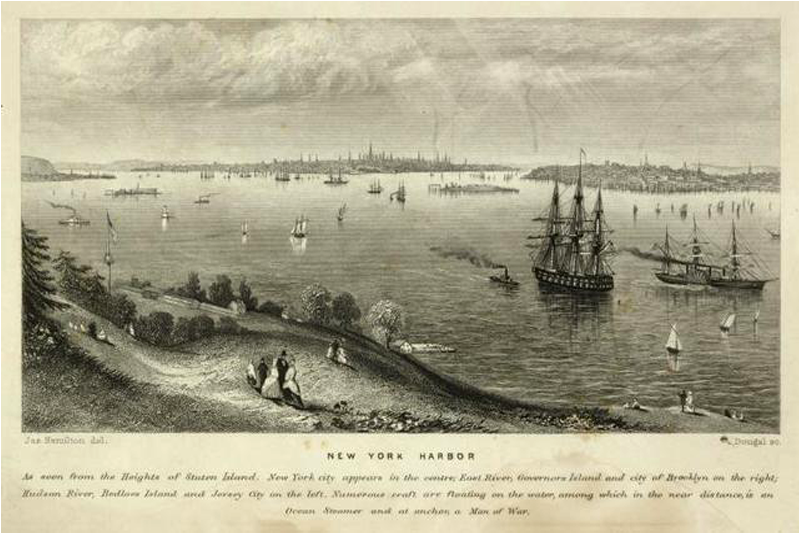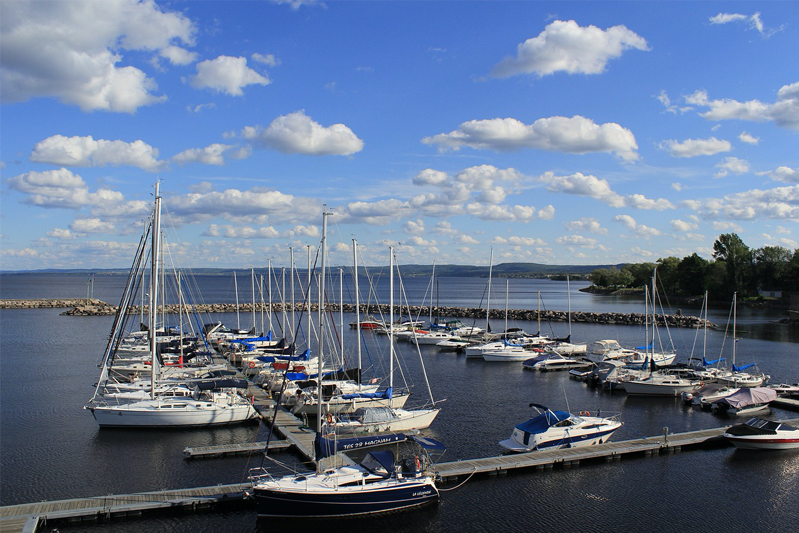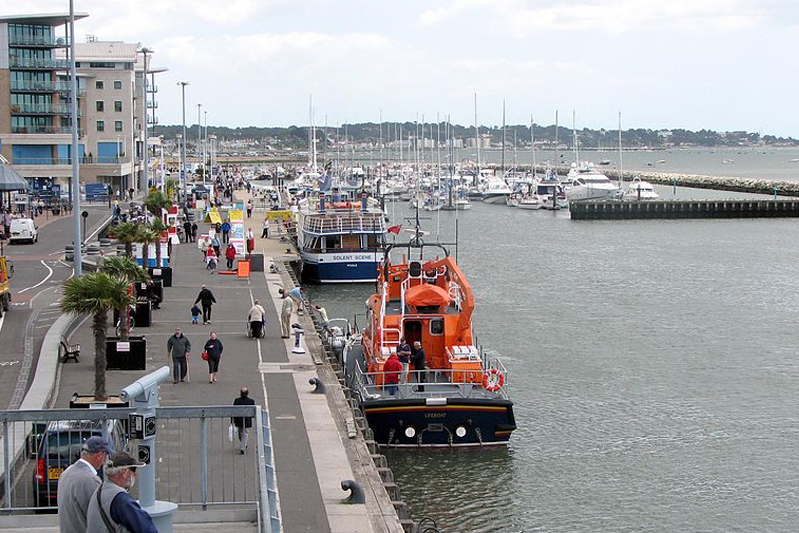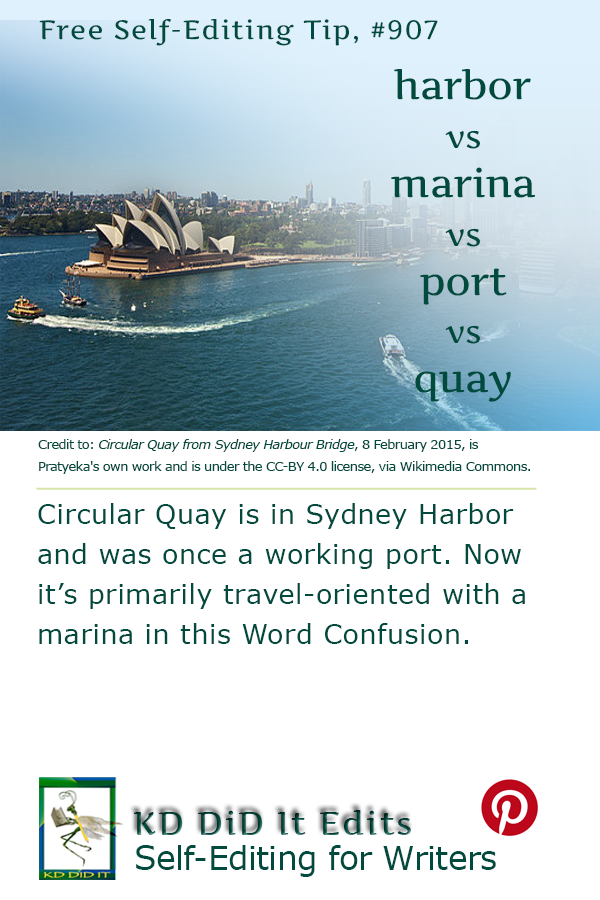You could think of harbor as being the daddy of ’em all, as marina, port, and quay couldn’t exist without a harbor.
And it’s that watery relationship that “Harbor vs Marina vs Port vs Quay” explores.
A harbor is a safe place for a boat or ship to pull up to. A marina is located in a harbor (or port) and generally caters to pleasure craft. Water-wise, a port is a town or city with a harbor while a quay is a platform that sticks out into the water to load and unload ships.
Harbor does offer another kind of refuge while port has a plethora of additional definitions that includes the left of anything, the wine (yum!), how one carries a rifle or oneself, customs, windows, computers, gateways, engines of all sorts, etc. But this post is only considering the water aspect. Just so’s ya know.
And no. A quay is not the same as a cay or a key.
Exploring Later . . .
You may want to explore “Anchorage, Haven, Moorage, and Roadstead“, “Arroyo vs Coulee vs Wadi vs Wash“, “Bay vs Bight vs Cove“, “Bayou vs Bog vs Marsh vs Swamp“, “Beach vs Coast vs Shore“, “Born vs Borne vs Bourn“, “Brook vs Burn vs Draw vs Lick“, “Canal vs Impoundment vs Moat vs Reservoir“, “Cay vs Key vs Quay“, “Channel vs Dyke vs Rill“, “Creak versus Creek“, “Dam versus Damn“, “Delta vs Estuary vs Rapids vs Source“, “Dock vs Pier vs Wharf“, “Firth vs Fjord vs Gulf“, “Lakes: Kettle, Loch, Mere, and Oxbow“, “Ocean versus Sea“, “Peer versus Pier“, “River vs Stream vs Tributary“, “Rivulet vs Runnel vs Sike“, “Sea versus See“, “Slew versus Slough“, and “Straight versus Strait“.
Word Confusions . . .
. . . started as my way of dealing with a professional frustration with properly spelled words that were out of context in manuscripts I was editing as well as books I was reviewing. It evolved into a sharing of information with y’all. I’m hoping you’ll share with us words that have been a bête noire for you from either end.
If you found this post on “Harbor vs Marina vs Port vs Quay” interesting, consider subscribing to KD Did It, if you’d like to track this post for future updates.
| Harbor | Marina | Port | Quay |
|---|---|---|---|
 |
 |
 |
 |
| Part of Grammar: | |||
| Noun; Verb, intransitive
Plural for the noun: harbors, harbours Third person present verb: harbors, harbours Alternate spelling: harbour [British] |
Noun
Plural: marinas |
Noun
Plural for the noun: ports |
Noun
Plural: quays |
| Noun: A place on the coast where vessels may find shelter, especially one protected from rough water by piers, jetties, and other artificial structures Verb, intransitive: |
A specially designed harbor with moorings for pleasure craft and small boats | A town or city with a harbor where ships load or unload, especially one where customs officers are stationed
|
A concrete, stone, or metal platform lying alongside or projecting into water for loading and unloading ships |
| Examples: | |||
| Noun: They enjoyed fishing in the harbor. The westerly wind kept us in harbor until the following afternoon. She swallowed and rushed in. “I’m here to ask about the berths available on the ships in harbor.” Verb, intransitive: Moments proceeded swiftly through the seas of time; after four passings of the moon a large fleet of ships harbored themselves in the bay. I first used them in an essay on Pope John XXIII, who believed the Church was like a ship that belonged at sea — not harboured in safe havens. |
I keep a slip at the marina.
We can picnic on my boat at the marina. The marina harbors ships and yachts of the high and mighty as well as modest ones for the common man. |
Our next stop was the French port of Toulon.
Port Elizabeth is a bustling city. The port has miles of docks. If he lived by a port, then his duties would require him to deal with the maintenance of ships and quays. There’s an abundant water supply and port facilities. Inland ports, such as Kansas City, Missouri, and Greenville, South Carolina, alleviate some of the pressure on coastal ports by handling that distribution workload. |
The men created a world of their own on the docks, levees, plantation landings, city quays, and steamboat decks of the Mississippi River economy.
In 1682, the estates of East Frisia gave Brandenburg–Prussia help by allowing their ships to use her quays in Emden — a large harbor on the North Sea. It is a sailing resort with all the related services such as mooring on floating bridges, catways, quays, fuel, showers, daily weather reports, and boat hire. Up to c. 1700, Britain’s ports had been largely natural coastal or riverside sites, sometimes with quays and wharfs for lading, and beaching vessels at low tide. |
| Derivatives: | |||
| Adjective: harborless, harbourless Noun: harbor-side, harborer, harbormaster, harbourer |
Adjective: portless | Adjective: quaylike Noun: quayage |
|
| History of the Word: | |||
| Late Old English herebeorg meaning shelter, refuge, herebeorgian meaning occupy shelter, is of Germanic origin and related to the Dutch herberge and the German Herberge, also to the French auberge meaning inn; see also harbinger. | Early 19th century from the Italian or Spanish, a feminine of marino, from the Latin marinus, which is from mare meaning sea. | Old English from the Latin portus meaning haven, harbor; it was reinforced in the Middle English by the Old French. | Late Middle English key, from the Old French kay, is of Celtic origin. The change of spelling in the late 17th century was influenced by the modern French spelling quai. |
C’mon, get it out of your system, bitch, whine, moan . . . which words are your pet peeves? Also, please note that I try to be as accurate as I can, but mistakes happen or I miss something. Email me if you find errors, so I can fix them . . . and we’ll all benefit!
Satisfy your curiosity about other Word Confusions on its homepage or more generally explore the index of self-editing posts. You may also want to explore Book Layout & Formatting Ideas, Formatting Tips, Grammar Explanations, Linguistics, Publishing Tips, the Properly Punctuated, Writing Ideas and Resources, and Working Your Website.
Resources for Harbor vs Marina vs Port vs Quay
Apple Dictionary.com
Dictionary.com: port
Editor. “What is the Difference Between a Port, Quay, Pier and Wharf?” The Shipping Law Blog.com. 2 Oct 2011. Web. 13 Aug 2020. <http://www.theshippinglawblog.com/2011/10/what-is-difference-between-quay-pier.html>.
Lexico.com: harbor, marina, port, quay
Pinterest Photo Credits:
Circular Quay from Sydney Harbour Bridge, 8 February 2015, is Pratyeka’s own work and is under the CC-BY 4.0 license, via Wikimedia Commons.
Revised as of 13 Apr 2024
By: Kathy Davie

